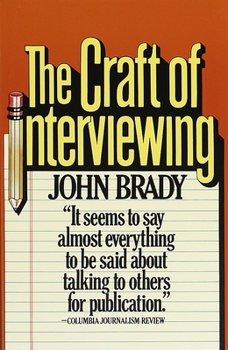The Craft of Interviewing
Select Format
Select Condition 
Book Overview
John Brady, editor of Writer's Digest and himself an accomplished interviewer, has put together an indispensable guide to the art of questioning. In a lively, down-to-earth manner, "The Craft of Interviewing" covers all aspects of the interview process -- getting the interview, doing research, handling the subject face-to-face, hurdling hazards, getting tough, taking notes (on the sly, if need be), taping, dealing with off-the-record types, concluding the interview, verifying it, and writing it up. Brady has also filled the book with a myriad of anecdotes revealing the experiences of some of the best known interviewers of our times. A noteworthy appendix on the history of the interview is included.
Format:Paperback
Language:English
ISBN:0394724690
ISBN13:9780394724690
Release Date:August 1977
Publisher:Knopf Doubleday Publishing Group
Length:272 Pages
Weight:0.63 lbs.
Dimensions:0.7" x 5.3" x 8.8"
Customer Reviews
5 ratings
You get more than you asked for but just what you need
Published by Thriftbooks.com User , 16 years ago
John Brady has written a helluva book. You think it's just about "interviewing": well, it is that, but so much more. You get elements of a fascinating autobiography. You get vignettes about some of the most important folks of the last century as object lessons about interviewing as an art. You get insights into the lives of those people who have devoted themselves to presenting, in a sensitive and coherent way, the real words of real people at moments of heightened passion (William Wordsworth: take note!). And you get a sometimes mellifluous and always piquant bit of writing. "The importance of being sternest"?! Just too good. Read this and then try to get some flavor out of what passes for the low-sodium instant dribble of most modern journalists. "How does it feel to win/lose the you-name-it...?" "Just great/awesome/awful... I'd like to thank...." May as well talk to a bladder just after it empties. We get what we deserve, unfortunately, in spite of people like John Brady. Don't read it to learn how to interview - although you will learn. Read it because you have to learn how to talk to other members of your species.
A Smart Part of a Journalist's Library
Published by Thriftbooks.com User , 21 years ago
"The Craft of Interviewing" by John Brady is just one book a beginning journalist should read. Most of journalism involves local newspapers covering local people, and despite how the internet has altered the speed and process of interviewing, good ol' gumshoe journalism still lives and breathes. That's why this book still matters 30 years after it first hit the college bookstores of j-school. A good interview requires knowledge, diplomacy, fearlessness, rapport, organization, and knowing how to separate and summarize it all for a good story. This book has chapters on all of this. One complete chapter, "Off the Record" discusses some interesting approaches and policies this misunderstood phrase calls for. As you build relationships with key sources, this chapter, and others, can assist you in seeing ways through the thorny challenges of integrity and journalism. Brady provides anecdotes about complicated interviews and interviewees. Even though these are with celebrities, the examples show the reader how to walk the line carefully and confidently. "The Craft of Interviewing" by John Brady should not be the only book you read, and probably not your first. I fully recommend it as both a classroom text, and as a personal edification book. Your interviewing will be better you apply what Brady suggests. Anthony Trendl editor, HungarianBookstore.com
Not a Cookbook, but a Guide for Thinkers
Published by Thriftbooks.com User , 22 years ago
Some people seem to be looking for just one way to conduct an interview: John Brady describes several. If you are looking for something like a cookbook where the specific questions you should ask and in what order are listed, you won't like this book. If you are looking to develop your own interview style and want to pick and choose from a variety of methods, then you will find Brady's book an excellent source of information. Brady covers everything from getting appointments to to research to notetaking to tape recorders to knowing when the interview is over. He shows how different people handle interviews over the phone or by letter. When you finish this book, the choice of what questions to ask and how you should go about the interview remain up to you, but Brady's book will have given you a solid base.Just about the only topic that is uncovered (due to the date of the book) is how to conduct an interview by Internet Chat. But a smart reader can easily adapt Brady's ideas to that situation.
If you're an easily offended woman, you are not a journalist
Published by Thriftbooks.com User , 23 years ago
Funny, I don't remember the parts about batting eyelashes and such. This book covers the fundamentals of interviewing and pre interview research. I found the book to be a useful tool for conducting interviews, and think that it would be very helpful to beginners. I am a nurse turned free lance writer, and the techniques and tips for securing interviews were helpful to me. I particularly liked the section on the "wrong questions"--this should be mandatory reading for local and national news reporters.
This captures the essence of interviewing
Published by Thriftbooks.com User , 25 years ago
I read this book ( published in 1976) many years ago. Since then, I've been a reporter and writer for the Wall Street Journal, Newsweek and Fortune. After a request to teach a journalism class, I purchased the book again, and found that it still captures the essence of interviewing. The examples in the book are a bit dated (it hasn't been revised ), but the underlying truths are still very close to those I've experienced in many interviews throughout my career.





